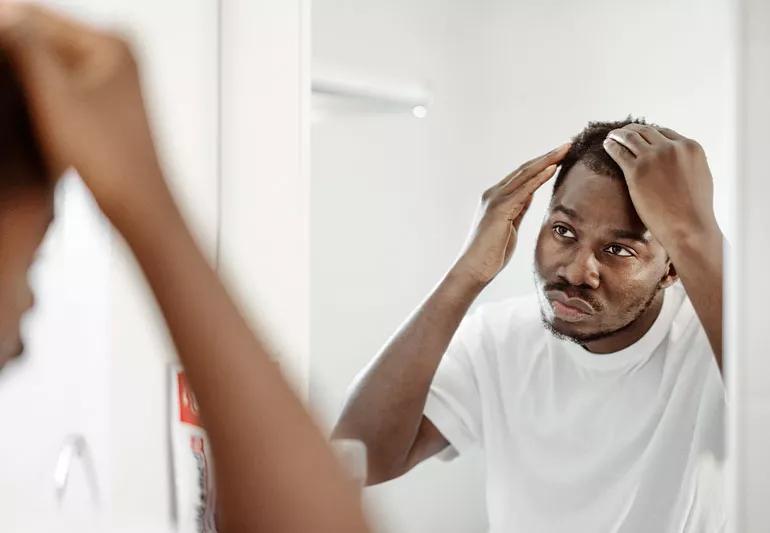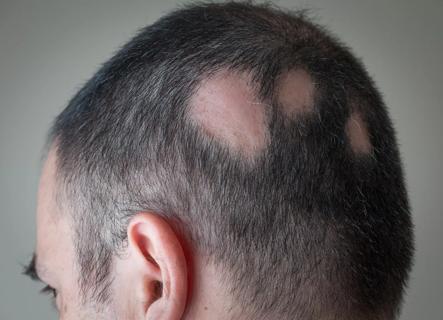Keep your hair on your head with these tips

If you’ve been splitting hairs over losing your hair, you’re not alone.
Advertisement
Cleveland Clinic is a non-profit academic medical center. Advertising on our site helps support our mission. We do not endorse non-Cleveland Clinic products or services. Policy
Hair loss, known as alopecia, is a common disorder affecting more than 80 million Americans.
So how do you know if you’re shedding more than normal?
On average, most people lose about 100 strands of hair a day. And with new strands growing to take place of the ones lost, most won’t notice a difference.
But if fewer or no strands grow back and you start noticing a receding hairline or thinning areas, you might have alopecia.
Dermatologist Wilma Bergfeld, MD, talks about ways to stop hair loss, what may cause it and whether it can be reversed.
Losing your hair not only affects your appearance, but it can also cause emotional stress and affect your confidence. There are a few things you can do to help stop hair loss, though.
You may not be getting enough protein each day and that can affect your hair growth.
Especially if you’re vegan or vegetarian, you may need to increase the amount of protein you consume.
“You need 40 to 60 grams a day,” says Dr. Bergfeld. “You can drink your protein, you don’t have to eat it in a food substance.”
Other ways to hit your daily protein requirement include eating beans and legumes, eggs or Greek yogurt.
Your doctor can perform various tests to see if you have a vitamin deficiency. Certain vitamins and minerals like vitamins A, B, C, D, E, zinc and iron can affect your hair growth.
Advertisement
Dr. Bergfeld has found success with prescribing biotin forte with zinc, a supplement that helps maintain healthy hair, skin and muscle tissue.
“There are new ones that include saw palmetto, calcium and selenium,” says Dr. Bergfeld. “All these are good. Just look for ones that come from a reputable company.”
Eating fruits, vegetables and protein — the main ingredients in the Mediterranean diet — can be helpful, especially compared to other trendy diets.
“When you go on these restrictive diets, you may lose weight but it’s probably something you can’t maintain,” says Dr. Bergfeld. “And they’re usually lacking in something that your hair follicles need.”
You may have heard of minoxidil, the over-the-counter medication that helps in preventing hair loss.
Available as a solution or foam that’s applied to your scalp, the medication has been approved by the U.S. Food and Drug Administration (FDA) at a 5% strength.
“We’ve been considering using low-dose oral minoxidil as a treatment,” says Dr. Bergfeld. “There are a handful of studies that show how helpful and safe it is.”
The FDA has approved this newer treatment to help with hair growth.
But low-level laser light therapy devices, which include wands and helmets, can be time-consuming and expensive, with options costing $200 to $1,000.
“It can reduce skin inflammation and initiate hair growth,” says Dr. Bergfeld. “It’s a no-brainer. You don’t have any drug interactions. You don’t have any intolerance. The worst thing you can get is a little bit of scalp sunburn, which can be dealt with just by using a lotion or even just reducing the time exposure.”
Avoid harsh hair treatments like heating tools, hair dye and bleaching. Hairstyles like tight ponytails or braids can affect your hair as well. Keep your scalp healthy by washing your hair and scalp regularly.
“Any inflammation on the scalp will affect the hair growth cycle,” says Dr. Bergfeld.
You might start seeing more hair loss than normal thanks to the following:
Working with a dermatologist, you can begin identifying what might be causing your hair loss. Your doctor will ask about your health, your medications and your family history.
“I tell the patients to keep track of events that are unusual for them, for instance, a heavy menstrual period,” says Dr. Bergfeld. “So when we go back to look for triggers, we’ll have some hint at what it could be.”
Advertisement
Your doctor will also look at other areas on your body like your eyebrows, lashes, underarms, pubic area, legs and arms to assess if there’s hair loss.
Many times, hair loss is an indicator that something more serious is going on.
“Hair loss, particularly shedding, is just a sign that something has happened to the body,” says Dr. Bergfeld. “The hair follicle is one of the three fastest turning over cell lines in your body. Anything that affects your body and throws it out of balance will affect those systems. So shedding hair is an indicator that something’s wrong.”
Yes and no. It depends on what type of hair loss you’re experiencing.
Some types, like cicatricial alopecia, are permanent, while others that may be caused by stress or a medical condition are temporary. Once the cause has been identified and eliminated, your hair should start growing back.
“Generally speaking, if the trigger goes away or whatever caused the injury to the hair follicle, then the hair will recover over a period of four to six months to a year,” says Dr. Bergfeld.
Advertisement

Sign up for our Health Essentials emails for expert guidance on nutrition, fitness, sleep, skin care and more.
Learn more about our editorial process.
Advertisement

Take steps to reduce stress by practicing meditation, finding time to relax and maintaining a healthy lifestyle

You may see pitting, brittleness or ridges in your fingernails and toenails

Your immune system may attack hair follicles anywhere on your body

It’s normal to lose around 50 to 150 strands per day to routine hair shedding

Studies are mixed, but frequently wearing very tight, warm hats could stress your follicles and lead to hair loss

Things like stress, heated styling and other health conditions may cause you to lose more hair than normal

Creatine does cause some side effects, but hair loss probably isn’t one of them

A gentle hair care routine, stress reduction and sun protection can help reduce flares and maintain your locks

Even small moments of time outdoors can help reduce stress, boost mood and restore a sense of calm

A correct prescription helps your eyes see clearly — but as natural changes occur, you may need stronger or different eyeglasses

Both are medical emergencies, but they are very distinct events with different causes